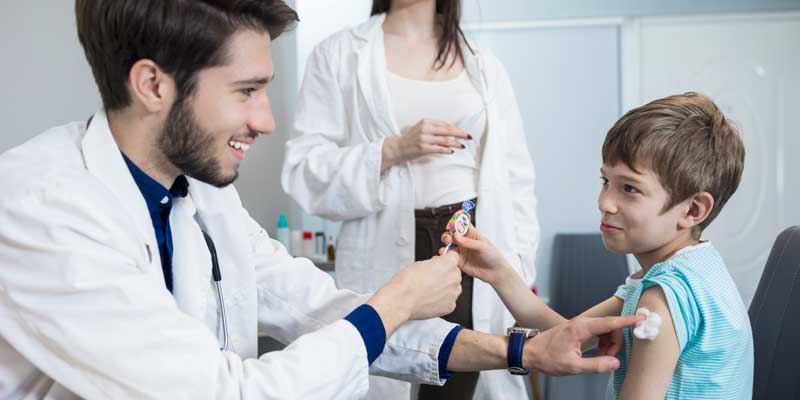A Shot in the Arm — CHR Team Gives Vaccine Safety Research a ‘Boost’
Stories - Aug 15 2018

By Katie Essick, Senior Technical Writer & Editor
Vaccination plays a major role in maintaining public health locally and across the globe. Many families in the United States immunize their children according to medical guidelines, and many adults stay on top of their own vaccinations, but public opinion on vaccine safety ranges from all-out approval to the belief that vaccines lead to severe medical issues. Available data suggest we have a lot of room to improve vaccination rates for both adults and children.
 Lucy A. Savitz
Lucy A. Savitz Allison L. Naleway
Allison L. Naleway
“The proven role of vaccination in preventing disease, disability, suffering, and death in both pediatric and adult populations is well established — from polio to meningitis and even more common ailments like pneumonia and influenza,” explains Lucy Savitz, PhD, MBA, vice president of research for Kaiser Permanente (KP) Northwest and director of the KP Center for Health Research (CHR). “Despite these successes, however, some groups continue to question the safety of vaccination.”
Analyzing vaccine safety and communicating the results are vital to supporting widespread public education on the matter. Enter the U.S. Centers for Disease Control and Prevention’s (CDC) Vaccine Safety Datalink (VSD) — and KP Northwest, one of eight members in the VSD network that monitors the safety of vaccines and conducts studies.
KP CHR Senior Investigator and Associate Program Director Allison Naleway, PhD, has been involved in the VSD since 2000, when she was doing her postdoctoral fellowship at another VSD site, the Marshfield Clinic in Wisconsin. She came to CHR as an investigator in 2003 and has been the principal investigator (PI) at the KP Northwest VSD site, based at CHR, since then. John Mullooly, PhD, the first KP Northwest site PI, retired from CHR in 2012. More than a dozen staff support the work of the VSD at CHR and it receives more than $1 million in funding each year from the CDC to conduct this work.
Allison and her colleagues — at CHR and across the nation — are committed to the work of the VSD. “We feel we have a moral obligation to do this research,” Dr. Naleway says. “With a lot of anecdotes and misinformation out there about vaccine safety, we must continue to conduct and publicize this work in order to let the science speak.”
Pooled data to address questions
The VSD makes use of electronic health record (EHR) data from each member site: KP Northwest, Northern California, Southern California, Colorado, and Washington; Health Partners in Minnesota; the Marshfield Clinic in Wisconsin; and Harvard Pilgrim in Massachusetts. Combined, that’s a total of about 11 million individual health records.
The researchers in the VSD network study vaccine safety questions, address concerns in the medical literature and elsewhere, monitor possible adverse or bad side effects when new vaccines are licensed or when there are new vaccine recommendations, and inform committees that make recommendations at the national level. “Because vaccines are usually given to healthy people, and may be required for school entry or work, the bar for vaccine safety is set really high,” Dr. Naleway explains.
In the VSD’s 28 years, nearly 300 vaccine studies have been conducted. CHR researchers have participated in more than half of them and published more than 100 manuscripts. Time and again, vaccines have proven safe.
The VSD is one significant part of the CDC Immunization Safety Office’s infrastructure for monitoring vaccine safety. Other components include a program co-sponsored by the CDC and the U.S. Food and Drug Administration (FDA) called the Vaccine Adverse Event Reporting System (VAERS). This program allows doctors, nurses, vaccine manufacturers, and the public to submit a report describing a potential negative reaction or side effect to a vaccine; about 30,000 reports are submitted and reviewed by CDC and FDA annually.
The Clinical Immunization Safety Assessment (CISA) network is another component to assessing vaccine safety. CISA investigators try to understand how a person’s genes or immune system may influence their chance of having a side effect from a vaccine, and they consult with health care providers who are treating patients with suspected vaccine reactions.
In addition to the VSD, VAERS, and CISA, the FDA monitors the safety of vaccines through the Post-Licensure Immunization Safety Monitoring (PRISM) project within the Sentinel System, a network of large health care insurance providers with EHR data for more than 100 million people.
Vast majority of vaccines safe
In the VSD’s 28 years, nearly 300 vaccine studies have been conducted. CHR researchers have participated in more than half of them and published more than 100 manuscripts.
Time and again, Dr. Naleway said, vaccines have proven safe. She pointed to three exceptions observed by the VSD: in the late 1990s, a new rotavirus vaccine, RotaShield, led to an increased risk of intussusception (obstruction of the intestines) in children and was quickly withdrawn from the market; administering a combined measles, mumps, and rubella (MMR), and varicella vaccine (chicken pox) to children caused a slight increase in febrile seizures (convulsions caused by a spike in body temperature), when compared to administering the MMR and varicella vaccine separately; and the influenza vaccine in very rare occasions increased the risk of Guillain-Barré syndrome.
KPNW’s VSD site focuses much of its work on the safety of vaccinations used during pregnancy, and Dr. Naleway has led the VSD pregnancy working group for many years.
Studies with CHR connections that have received attention in recent years include one that concluded there is no association between the quadrivalent human papillomavirus vaccine (4vHPV) and spontaneous abortion. The findings were published in the July 2018 issue of Obstetrics & Gynecology.
Another study, also co-authored by Dr. Naleway, found that infants are not at risk of hospitalization or death if their mothers receive influenza and Tdap (tetanus, diphtheria, and acellular pertussis) vaccinations during pregnancy. Results were published in February 2018 in Pediatrics.
Yet another examined whether infants receiving multiple vaccinations can be at risk of other types of infections. The findings, published in JAMA in March 2018, found that the vaccinations did not harm the immune system.
Currently, the VSD has 52 active studies. These include safety studies being led by CHR VSD team members: HPV Vaccine and Primary Ovarian Insufficiency (results from this study will be published later this summer), Safety of Hepatitis A and Hepatitis B Vaccine during Pregnancy, Pediatric Inflammatory Bowel Disease and Rotavirus Vaccination, Rates of Herpes Zoster among Vaccinated and Unvaccinated Children, and Syncope following Adolescent Vaccination.
“The work of the VSD is a reflection of Kaiser Permanente’s ongoing commitment to research and its reputation as one of the nation’s leading research institutions,” says Dr. Savitz. “The VSD contributes to KP Research’s goal to transform the future of health by generating the knowledge that informs patient and provider collaborative decision-making as well as ensuring the quality, safety and value of health care.”